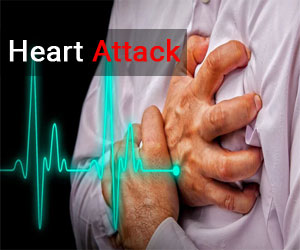- Home
- Editorial
- News
- Practice Guidelines
- Anesthesiology Guidelines
- Cancer Guidelines
- Cardiac Sciences Guidelines
- Critical Care Guidelines
- Dentistry Guidelines
- Dermatology Guidelines
- Diabetes and Endo Guidelines
- Diagnostics Guidelines
- ENT Guidelines
- Featured Practice Guidelines
- Gastroenterology Guidelines
- Geriatrics Guidelines
- Medicine Guidelines
- Nephrology Guidelines
- Neurosciences Guidelines
- Obs and Gynae Guidelines
- Ophthalmology Guidelines
- Orthopaedics Guidelines
- Paediatrics Guidelines
- Psychiatry Guidelines
- Pulmonology Guidelines
- Radiology Guidelines
- Surgery Guidelines
- Urology Guidelines
Colchicine cheap and effective option for secondary prevention after MI: COLCOT Trial

Canada: According to the randomized COLCOT trial Colchicine is a cheap and effective option for secondary prevention of MI. The prevention of coronary artery disease (CHD) and particularly of myocardial infarction (MI) is based on some well-designed strategies aimed at treating both asymptomatic high-risk patients called primary prevention and patients with established CHD is known as secondary prevention. The standard regime for secondary prevention consists of ACE inhibitors or Angiotensin-converting enzyme inhibitors, Aspirin, β blockers and Statins.
Inflammation has long been posited as a likely mediator of atherosclerotic cardiovascular disease (ASCVD). Therefore latest additions in the list are anti-inflammatory agents which control athero-inflammation and reduce thrombotic complications after an acute coronary episode. The anti-inflammatory drugs that have been used for secondary prevention of CHD include drugs like canakinumab, evolocumab, methotrexate and colchicine.
Patients who received a daily dose of 0.5 mg colchicine after myocardial infarction (MI) had a significantly lower risk of ischemic cardiovascular events than placebo, finds a recent study published in the New England Journal of Medicine. In the new trial, colchicine reduced by as much as 34% a heart attack survivor's combined risk of either dying from heart disease or having a cardiac arrest, a heart attack, a stroke or angioplasty.
Colchicine is an inexpensive orally administered, potent anti-inflammatory medication that is indicated for the treatment of gout and pericarditis. Inflammation is known to play a role in atherosclerosis and its complications also.
Jean-Claude Tardif, Montreal Heart Institute, Montreal, Canada, and colleagues conducted this Colchicine Cardiovascular Outcomes Trial (COLCOT) to evaluate the effects of colchicine on cardiovascular outcomes as well as its long-term safety profile in patients who had recently had a myocardial infarction.
For the purpose, the researchers performed a randomized, double-blind trial involving 4745 patients recruited within 30 days after myocardial infarction. They were randomly assigned to receive either low-dose colchicine (0.5 mg once daily) (n=2366) or placebo (2379). Patients were followed for a median of 22.6 months.
The primary efficacy endpoint was a composite of death from cardiovascular causes, resuscitated cardiac arrest, myocardial infarction, stroke, or urgent hospitalization for angina leading to coronary revascularization. The components of the primary endpoint and safety were also assessed.
Read Also: Use NSAID naproxen over low-dose colchicine for gout flares treatment, suggests BMJ study
Key findings of the study include:
- The primary endpoint occurred in 5.5% of the patients in the colchicine group, as compared with 7.1% of those in the placebo group (hazard ratio, 0.77).
- The hazard ratios were 0.84 for death from cardiovascular causes, 0.83 for resuscitated cardiac arrest, 0.91 for myocardial infarction, 0.26 for stroke, and 0.50 for urgent hospitalization for angina leading to coronary revascularization.
- Diarrhoea was reported in 9.7% of the patients in the colchicine group and in 8.9% of those in the placebo group.
- Pneumonia was reported as a serious adverse event in 0.9% of the patients in the colchicine group and in 0.4% of those in the placebo group.
Read Also: Colchicine – an alternative option to prevent post-operative atrial fibrillation
The bottom line of the study is -- Among patients with a recent myocardial infarction, colchicine at a dose of 0.5 mg daily led to a significantly lower percentage of patients with ischemic cardiovascular events than placebo.
The study, "Efficacy and Safety of Low-Dose Colchicine after Myocardial Infarction," is published in the New England Journal of Medicine.
DOI: 10.1056/NEJMoa1912388
Journal Information: New England Journal of Medicine

Disclaimer: This site is primarily intended for healthcare professionals. Any content/information on this website does not replace the advice of medical and/or health professionals and should not be construed as medical/diagnostic advice/endorsement or prescription. Use of this site is subject to our terms of use, privacy policy, advertisement policy. © 2020 Minerva Medical Treatment Pvt Ltd